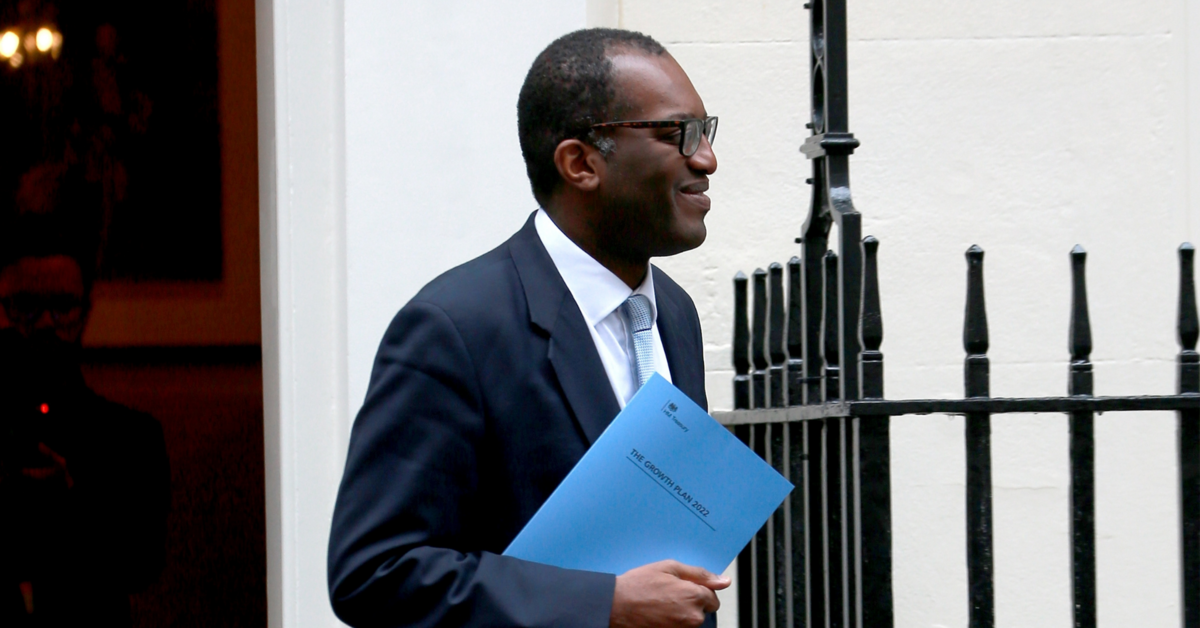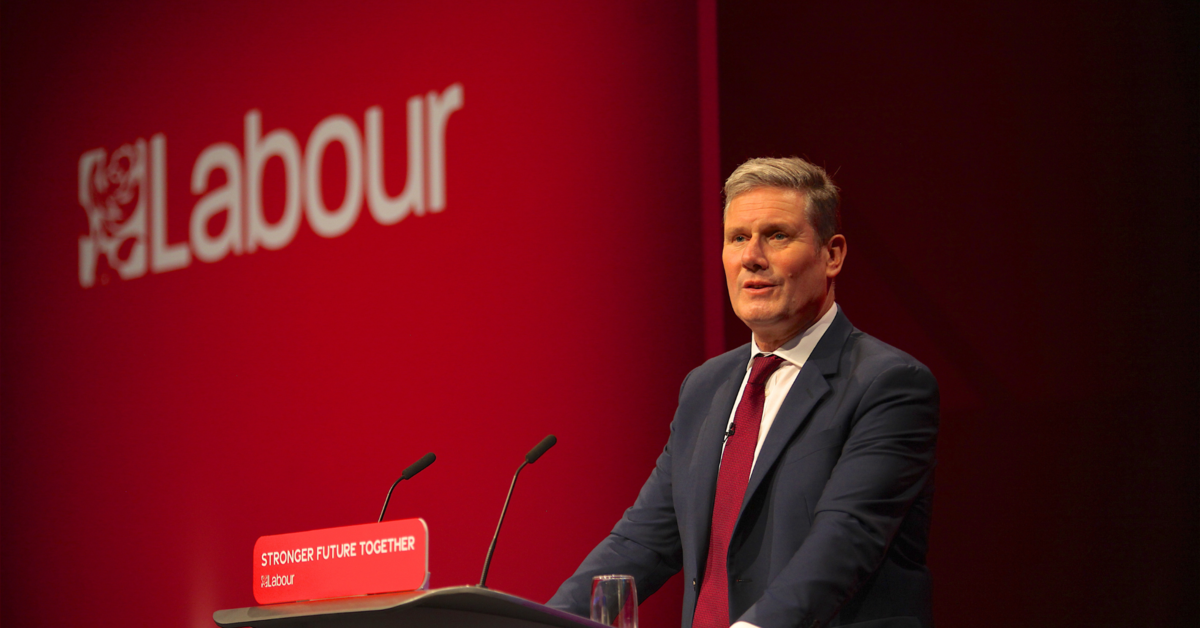Chancellor speaks to Conservative Conference after Government U-turn on Top Tax Rate
- Chancellor’s conference speech acknowledges turbulence of the past few days and makes no new policy announcements.
- Earlier in the day Kwasi Kwarteng announced that the Government will not go ahead with the scrapping of the top 45p rate for income over £150,000 a year.
- This was a measure announced in Kwarteng’s ‘mini-budget’ just over a week ago and has been uncomfortably defended by the Government since then
ISSUE
Kwasi Kwarteng, the Chancellor of the Exchequer, began his speech to Conference with the enthusiastically delivered, but wearisome statement “Thank you conference. What a day! It has been tough!” It had indeed been another turbulent 48 hours for the Chancellor and Liz Truss the Prime Minister. Just yesterday morning the Prime Minister had been telling broadcasters that the abolition of the top rate of income tax – the most politically eye-catching part of the ‘mini-budget’ – would remain government policy. But in hurried, midnight meetings the PM and Chancellor decided to u-turn and briefed the decision to the media ahead of any discussion with other cabinet ministers.
Ten days ago the Chancellor, delivered a budget in all but name which departed radically from the established Conservative economic practice of the past twelve years. It set out £45 billion of unfunded tax cuts (including that decision to scrap the top rate of tax), without any OBR projections on the impact of these policy changes.
In the days since, markets have been in turmoil as they have demonstrated a lack of confidence in the Government’s economic credibility. The pound dropped to its lowest level against the dollar, the cost of borrowing for the government has shot up and consequently the Bank of England has had to take emergency action to rescue pension funds who were heavily invested in government debt.
While the market reaction is based on a wider lack of confidence, the measure that has drawn most political criticism is the scrapping of the top income tax band for high earners, the so-called “45p rate”. This policy is estimated to cost around £2 billion, a small fraction of the overall £45 billion of unfunded tax cuts announced in the ‘mini-budget’. But the contrast of a substantial tax cut for very high earners (alongside the removal of the bankers’ bonus cap) with rapidly rising mortgage rates (caused by the market turbulence), and the government’s refusal to commit to uprating benefits in line with inflation, was described as ‘a display of the wrong values’ by former Cabinet Minister, Michael Gove, who has led the Conservative rebellion against the measures.
The reaction from those in Birmingham has been muted, cautious and downbeat; palpably different from the buoyant, confident and professional showing of the Labour Party conference last week.
In that context, the Chancellor’s speech was brief and had no new policy announcements. He made an “iron-clad commitment to fiscal discipline” and to the institutions that are the guard rails of the economy in the Bank of England, Treasury and Office for Budget Responsibility, which will be welcomed, if questioned. He repeated commitments to scrap all EU retained law by the end of 2023 and to deregulate with vigour. And he made boiler-plate references to going for growth instead of managing decline. For Chancellors, their Conference speech is the chance to make an argument to the nation about their economic approach, but for today it was probably wise to keep it short and lacking in novelty or nuance.
What does it mean?
Market reaction to this morning’s u-turn has been moderate. The pound has ticked up against the dollar measurably if not significantly. The Bank is continuing to intervene in the gilts market (though to a lesser degree today) and there remain considerable concerns about the liquidity of some funds. The long-run projection for the base rate has fallen slightly but is still well above where it was before the ‘mini-budget’. This hits the public finances hard and is continuing to dramatically change the mortgage rates available to consumers. In practice, the effect of the policy change is so small – it wipes off £2 billion from the overall £45 billion of tax cuts – that Paul Johnson, Director of the Institute for Fiscal Studies said, this has “essentially no effect on fiscal sustainability”.
The immediate threat of a government defeat on a key part of this major package of economic reform has been assuaged. And in many ways the u-turn was the only decision open to the Prime Minister and Chancellor – continuing to defend it through countless interviews and speeches and the rest of the party conference was inconceivable. That being said, the political and economic consequences of the u-turn are significant and will be long-lived.
Why does it matter?
Just two weeks ago the Prime Minister told journalists she was willing to be unpopular in taking the tough decisions to get growth going. Truss had thus far appeared unbothered by the reaction to the fiscal statement, with reports that a shouting match with the Chancellor was what was required to convince her to put out a statement after the pound plummeted last week.
But four weeks into the job, on the brink of a party conference that should have been a victory rally, the market turbulence, collapse in support in the polls and U-turn on a key measure has robbed the Prime Minister of much of the political authority needed to drive through her agenda. Just 31 Conservative MPs need to vote against the Government to defeat it on any measure. Having being forced into such an abrupt change of policy, MPs will feel empowered to stand their ground on all the difficult decisions ahead.
Where is it going?
To what extent the Prime Minister and Chancellor will now slam the brakes on their radical agenda remains to be seen, but the Chancellor’s speech shows that this morning’s dramatic U-turn was certainly not a Damascene conversion to a less aggressive economic strategy. They will still be determined to push on with their plans for deep public spending cuts, but the question is at what pace. This morning’s decision was one based on party management, made in the face of Gove and others daring them to remove the Whip following the upcoming statement on medium term fiscal plans in November. It is, however, just the tip of the iceberg. Wide and deep public spending cuts are now inevitable given the rising cost of government borrowing. Deep cuts to health, education, welfare or infrastructure – the four big pots of government spending – will be painful for millions of people. Mortgage rates are shooting up as a result of the rising cost of borrowing on the markets, And, with Labour taking huge 20+ point leads in almost all opinion polls conducted in the last week, the public are blaming the Prime Minister and Chancellor for these difficulties. With the economic forecast remaining desperately gloomy at best, the political path ahead is tougher for this new Prime Minister than for any of her predecessors in the last 50 years.



